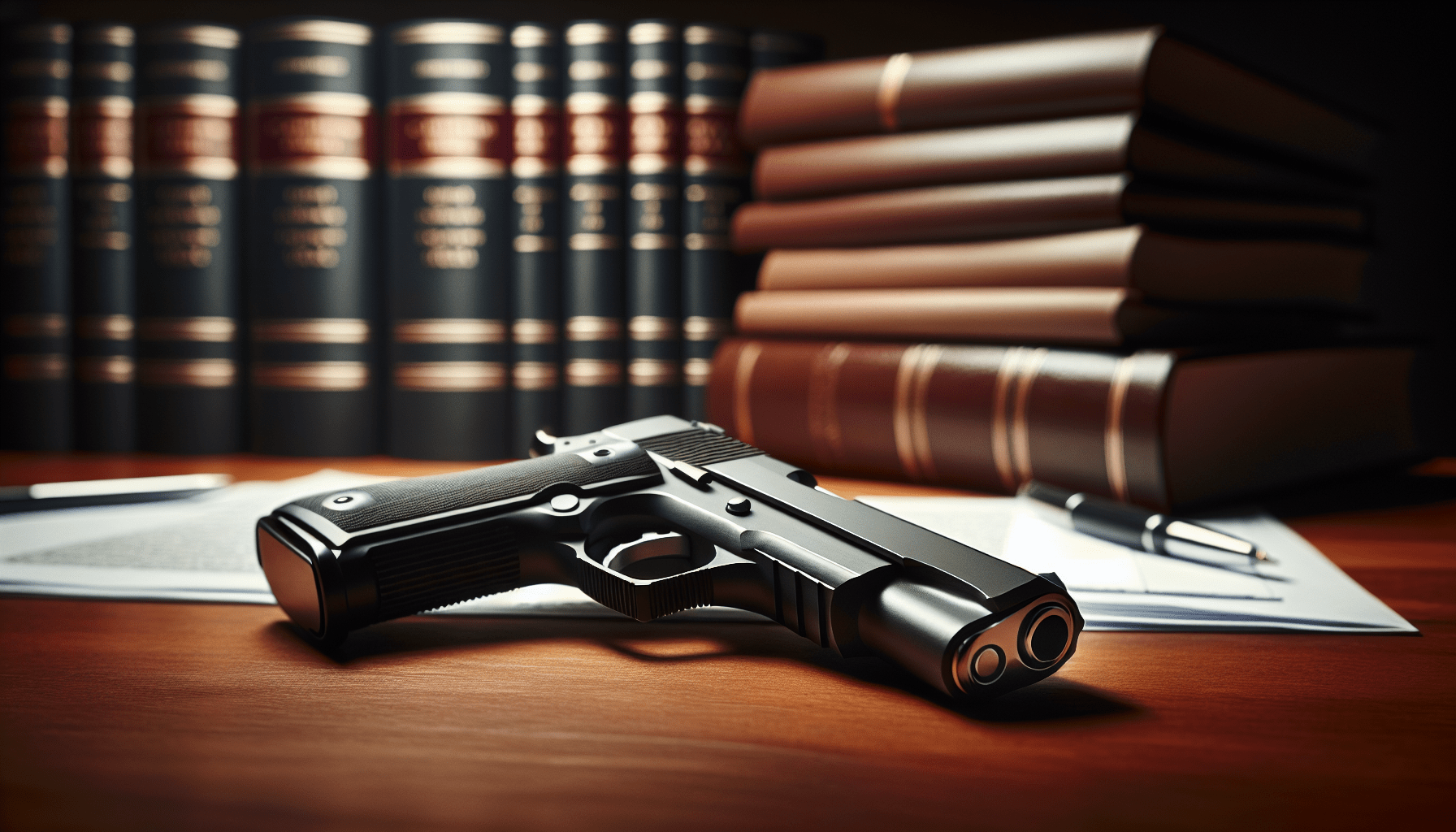Have you ever considered the legal implications of using a firearm for home defense? It’s a complex topic, and understanding these intricacies can mean the difference between protecting your home and finding yourself in legal trouble.

Understanding Self-Defense Laws
Legal principles surrounding self-defense are as old as humanity itself, but the specifics can vary significantly based on where you live. Generally, self-defense laws fall under the umbrella of criminal law and revolve around the concept that you are allowed to use reasonable force, including deadly force, to protect yourself and others from immediate harm.
Castle Doctrine
One popular term you might come across in your research is the “Castle Doctrine.” This principle asserts that your home is your castle, and you have the right to defend it. In plain English, it means you have no duty to retreat if someone unlawfully enters your home. However, the laws vary by state, and some are more lenient than others.
Stand Your Ground Laws
Another key term is “Stand Your Ground” laws. These laws expand upon the Castle Doctrine, allowing you to use deadly force in self-defense without a duty to retreat, regardless of whether you’re in your home or elsewhere. Again, it’s worth noting that these laws are specific to certain states.
Reasonable Force
It’s critical to remember that even in states with robust self-defense laws, the force used must be “reasonable.” What constitutes reasonable force is usually determined by the circumstances. For example, using a firearm against an unarmed intruder may be deemed excessive unless you can demonstrate an imminent threat to your life.
The Importance of Knowing Your State Laws
State-by-state variations in self-defense laws can make it a legal minefield. Here’s a table to give you an idea of how these doctrines are implemented across different states:
| State | Castle Doctrine | Stand Your Ground | Duty to Retreat |
|---|---|---|---|
| Florida | Yes | Yes | No |
| California | Yes | No | Yes |
| New York | Yes | No | Yes |
| Texas | Yes | Yes | No |
Florida
In Florida, both the Castle Doctrine and Stand Your Ground laws apply. Here, you are allowed to use deadly force if you believe you are facing an imminent threat, whether you’re at home or out in public. There is no duty to retreat.
California
California also has a Castle Doctrine, but it does not have Stand Your Ground laws. The rules are more stringent, requiring you to retreat if it’s safe to do so before using deadly force.
New York
New York upholds the Castle Doctrine, but it does not recognize Stand Your Ground laws. Additionally, there’s a duty to retreat if you can do so safely without jeopardizing your own safety.
Texas
Texas supports both the Castle Doctrine and Stand Your Ground laws, offering more legal protection when using deadly force for self-defense with no duty to retreat.
Legal Consequences of Self-Defense Gone Wrong
Even if your actions are legally justified, the legal aftermath can be draining. You could face a civil lawsuit from the intruder (or their family), and the opposing party may claim you used excessive force or acted rashly.
Criminal Charges
Yes, you read that right. Even if you think you’re in the clear, you could still face criminal charges, and it wouldn’t be the first time an individual was prosecuted under seemingly clear-cut self-defense circumstances. Legal proceedings can be lengthy, emotionally taxing, and expensive.
Civil Lawsuits
In some particularly litigious states, a criminal acquittal isn’t the end of your legal woes. Civil lawsuits can be brought against you by the family of the intruder for wrongful death or injury. These lawsuits can entangle you in years of legal battles.
Engaging a Lawyer
Once you’ve decided that a firearm is an essential part of your home defense strategy, it’s prudent to engage a lawyer. While nobody wants to think about the “what-ifs,” a legal expert can guide you through the specific laws applicable in your jurisdiction.
When to Contact a Lawyer
Ideally, you should consult a lawyer before an incident occurs. Pre-incident consultation can set a clear understanding of your state’s laws. However, immediate legal counsel is vital after any event involving the use of a firearm for self-defense.
Choosing the Right Lawyer
Not all lawyers are created equal, especially when it comes to self-defense cases involving firearms. Opt for a lawyer with a robust understanding of both criminal and civil laws related to self-defense. Read reviews, ask for recommendations, and meet with potential lawyers to gauge their competency and comfort in handling your case.

Firearm Training and Responsibility
Now, let’s talk about the importance of training and responsibility in using firearms for home defense. Owning a gun is a significant responsibility that goes beyond simply knowing how to pull the trigger.
Training Programs
Owning a gun for self-defense is just the first step. Adequate training ensures you’re prepared for the high-pressure scenarios where you might need to use it. Training encompasses learning how to handle your firearm safely, maintain it properly, and most importantly, use it effectively in a home defense scenario.
Simulation Experiences
Simulation experiences offer a safe, controlled environment to practice. At Green Line Arms, you can immerse yourself in a range of scenarios that prepare you for real-life situations. This is where theory meets practice. The virtual shooting range allows you to hone your skills without the hazards of a live range.
Legal Aspects of Training
A well-documented training program can also serve as evidence that you were a responsible gun owner should you find yourself in legal trouble. Training certificates and performance records can be critical in demonstrating your competence and judgment.
Access to Firearm Accessories
Proper accessories are essential for both operational efficiency and legal defensibility. Firearm accessories range from scopes, grips, and holsters to essential first responder medical kits. It’s vital to ensure these accessories are appropriate and legally compliant.
Grips and Scopes
When it comes to grips and scopes, select options that enhance your accuracy and control. Reliable performance can underpin claims of reasonable and justified use of force.
Holsters
A good holster ensures quick access while preventing accidental discharges. In a stressful situation, a durable and effective holster can make all the difference.
First Responder Medical Kits
Green Line Arms strongly recommends incorporating first responder medical kits into your home defense arsenal. These kits can be crucial in treating injuries and stabilizing persons until professional medical help arrives. In some cases, rendering immediate aid could influence the legal outcome of the scenario.
Importance of Firearm Safety
Gun safety cannot be overstated. Ensuring that firearms are stored securely and safely becomes particularly pertinent if you have children or non-gun-using adults in the household.
Safe Storage
Safe storage of firearms involves more than just putting it out of reach. Utilize safes, locked cabinets, and trigger locks to prevent unauthorized use. Safety practices not only protect loved ones but can also be a point in your favor if you ever need to defend the legality of your actions.
Regular Maintenance
A well-maintained firearm is a safe firearm. Regular checks and professional maintenance prevent malfunctions that could prove catastrophic in an emergency.
Community and Legal Resources
Engaging in a community of responsible gun owners and staying informed about legislative changes can enhance your preparedness and understanding.
Green Line Arms Community
At Green Line Arms, you gain access to a network of like-minded individuals who prioritize safety, education, and responsibility. Participating in discussions, forums, and training sessions provides ongoing learning and support.
Keeping Up with Legal Changes
Legislation regarding firearms and self-defense laws can change. Stay updated through reliable legal sources and community guidelines. Green Line Arms often provides updates and educational resources to keep you informed.
Conclusion
Understanding the legal implications of using firearms for home defense is as critical as knowing how to use the firearm itself. While laws vary by jurisdiction, the principles of reasonable force, duty to retreat, and necessity remain central. Being informed and prepared, from legal consultation to rigorous training and safe storage, helps ensure that you protect your home effectively and responsibly.
For all your firearm needs—including training, accessories, and legal education—consider visiting Green Line Arms. We’re here to help you build a safer, well-informed community of responsible gun owners. Remember, PRAY FOR PEACE – PREPARE FOR WAR.




